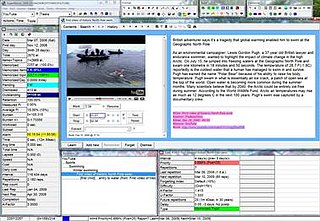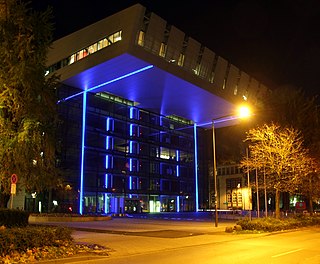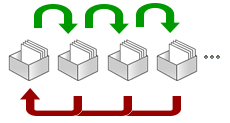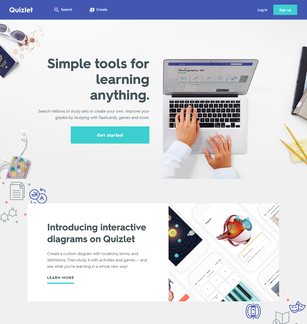Related Research Articles

Spaced repetition is an evidence-based learning technique that is usually performed with flashcards. Newly introduced and more difficult flashcards are shown more frequently, while older and less difficult flashcards are shown less frequently in order to exploit the psychological spacing effect. The use of spaced repetition has been proven to increase the rate of learning.

SuperMemo is a learning method and software package developed by SuperMemo World and SuperMemo R&D with Piotr Woźniak in Poland from 1985 to the present. It is based on research into long-term memory, and is a practical application of the spaced repetition learning method that has been proposed for efficient instruction by a number of psychologists as early as in the 1930s.

RWTH Aachen University, also known as Rhine-Westphalia Technical University of Aachen, Technical University of Aachen, University of Aachen, or Rheinisch-Westfälische Technische Hochschule Aachen, is a German public research university located in Aachen, North Rhine-Westphalia, Germany. With more than 47,000 students enrolled in 144 study programs, it is the largest technical university in Germany.
Educational games are games explicitly designed with educational purposes, or which have incidental or secondary educational value. All types of games may be used in an educational environment, however educational games are games that are designed to help people learn about certain subjects, expand concepts, reinforce development, understand a historical event or culture, or assist them in learning a skill as they play. Game types include board, card, and video games.

Secure Digital, officially abbreviated as SD, is a proprietary non-volatile flash memory card format developed by the SD Association (SDA) for use in portable devices.

Near-field communication (NFC) is a set of communication protocols that enables communication between two electronic devices over a distance of 4 cm (1.57 in) or less. NFC offers a low-speed connection through a simple setup that can be used to bootstrap more capable wireless connections. Like other "proximity card" technologies, NFC is based on inductive coupling between two so-called antennas present on NFC-enabled devices—for example a smartphone and a printer—communicating in one or both directions, using a frequency of 13.56 MHz in the globally available unlicensed radio frequency ISM band using the ISO/IEC 18000-3 air interface standard at data rates ranging from 106 to 424 kbit/s.

A flashcard or flash card is a card bearing information on both sides, which is intended to be used as an aid in memorization. Each flashcard bears a question on one side and an answer on the other. Flashcards are often used to memorize vocabulary, historical dates, formulae or any subject matter that can be learned via a question-and-answer format. Flashcards can be virtual, or physical.

Study skills or study strategies are approaches applied to learning. Study skills are an array of skills which tackle the process of organizing and taking in new information, retaining information, or dealing with assessments. They are discrete techniques that can be learned, usually in a short time, and applied to all or most fields of study. More broadly, any skill which boosts a person's ability to study, retain and recall information which assists in and passing exams can be termed a study skill, and this could include time management and motivational techniques.

The Leitner system is a widely used method of efficiently using flashcards that was proposed by the German science journalist Sebastian Leitner in 1972. It is a simple implementation of the principle of spaced repetition, where cards are reviewed at increasing intervals.

Contactless payment systems are credit cards and debit cards, key fobs, smart cards, or other devices, including smartphones and other mobile devices, that use radio-frequency identification (RFID) or near-field communication for making secure payments. The embedded integrated circuit chip and antenna enable consumers to wave their card, fob, or handheld device over a reader at the Point-of-sale terminal. Contactless payments are made in close physical proximity, unlike other types of mobile payments which use broad-area cellular or WiFi networks and do not involve close physical proximity.
Betavine was an open community and resource website, created and managed by Vodafone Group R&D, for the mobile development community in order to support and stimulate the development of new applications for mobile and Internet communications. The Betavine website allows developers to upload and profile their alpha-stage and beta-stage applications, provides interaction tools for members to share knowledge and give feedback on apps, and discuss topics in mobile. Betavine also contains a growing resources section with technical topics and APIs.
Card sorting is a technique in user experience design in which a person tests a group of subject experts or users to generate a dendrogram or folksonomy. It is a useful approach for designing information architecture, workflows, menu structure, or web site navigation paths.
Anki is a free and open-source flashcard program using spaced repetition, a technique from cognitive science for memorization. The name comes from the Japanese word for "memorization".

Quizlet is a multi-national American company that provides tools for studying and learning. It was founded by Andrew Sutherland in October 2005 and released to the public in January 2007. Quizlet's primary products include digital flash cards, matching games, practice electronic assessments, and live quizzes. In 2017, 1 in 2 high school students used Quizlet. As of December 2021, Quizlet has over 500 million user-generated flashcard sets and more than 60 million active users.
StudyBlue was an online studying platform for high school and college students. The website allowed users to upload class study materials, create electronic flashcards to study and share with others, and practice quizzes. StudyBlue allowed students to store their notes in the cloud and connect with other students studying the same subjects. StudyBlue content could be accessed online or on mobile phone applications. The company served students at high schools, community colleges, and universities predominantly in the United States and Canada, but also around the world. Originally based in Madison, WI, StudyBlue was located in San Francisco, CA as of September 2012. StudyBlue was acquired by Chegg in 2018 for $20.8 million and discontinued at the end of 2020.

OpenCards is a free spaced repetition flashcard program. The software is similar to SuperMemo, Anki or Mnemosyne.
Turi is a graph-based, high performance, distributed computation framework written in C++. The GraphLab project was started by Prof. Carlos Guestrin of Carnegie Mellon University in 2009. It is an open source project using an Apache License. While GraphLab was originally developed for Machine Learning tasks, it has found great success at a broad range of other data-mining tasks; out-performing other abstractions by orders of magnitude.

The Ghana Card is the national Identity card that is issued by the Ghanaian authorities to Ghanaian citizens – both resident and non-resident, legal and permanent residents of foreign nationals. It is proof of identity, citizenship and residence of the holder. The current version is in ID1 format and biometric. It is issued by the National Identification Authority of Ghana and Regarded as a property of the country as such.

The R4 is an unlicensed flash cartridge for the Nintendo DS handheld system. It allows ROMs and homebrew to be booted on the Nintendo DS handheld system from a microSD card. This allows the user to run homebrew applications, to store multiple games and MP3 music files on a single memory card, and to play games that have been backed up by the user.
Brainscape is a web and mobile education platform that allows students to study adaptive flashcards. The website and mobile application allow students, teachers, and corporate trainers to create electronic flashcards, and to find flashcards created by other users and publishers around the world. Brainscape flashcards and marketing content are also created by expert educators and publishers with whom Brainscape closely partners to create flashcards aligned to strict instructional guidelines. Flashcards are all stored in the cloud and can be shared with groups of other learners.
References
- ↑ Pash, Adam (2009-05-19). "Cobocards Is an Impressive, Collaborative Flash Card Webapp". Lifehacker. Archived from the original on 2012-06-17. Retrieved 2012-02-04.
- 1 2 3 "Cobocards - Imprint". Cobocards. 2012-02-04. Archived from the original on 2012-01-05. Retrieved 2012-02-04.
- ↑ "start2grow Winner 2009". start2grow. 2012-02-24.